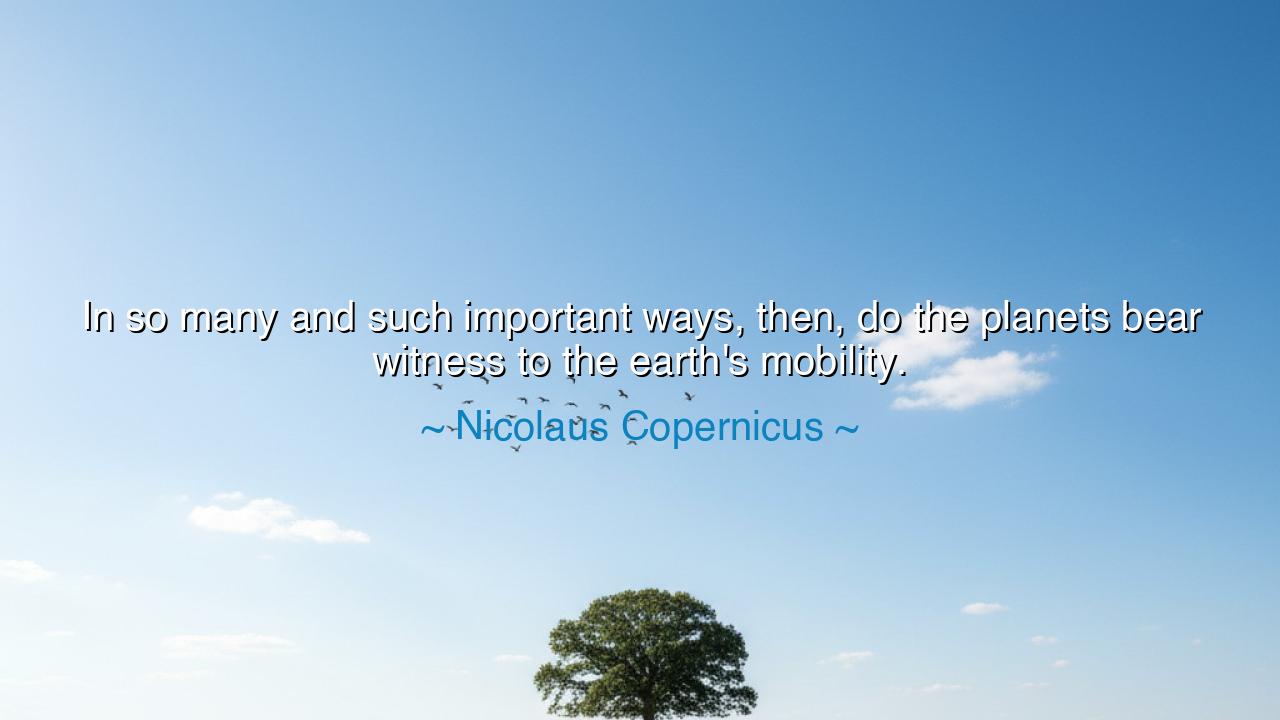
In so many and such important ways, then, do the planets bear
In so many and such important ways, then, do the planets bear witness to the earth's mobility.






"In so many and such important ways, then, do the planets bear witness to the earth's mobility." — these words, spoken by Nicolaus Copernicus, mark the dawn of a profound revolution in human understanding. To the ancients, the Earth was the center of the universe. The Sun, the stars, and the planets were thought to revolve around our world, as if all creation existed to serve humankind. Yet Copernicus, with his revolutionary insight, dared to challenge this ancient belief, proposing that the Earth itself was not still, but in constant motion, orbiting the Sun just as the planets orbited it. Through his words, Copernicus invited humanity to view the universe in an entirely new way—a way that would forever alter our perception of cosmic order.
In the days of the ancients, the heavens were viewed with awe and mystery. Ptolemy, a great philosopher and astronomer, had established the geocentric model of the universe, where the Earth sat at the center, and all heavenly bodies moved in perfect circles around it. This belief was deeply woven into the fabric of ancient philosophy and religion. It seemed undeniable—how could the Earth not be the center of the cosmos when all around us appeared still? The movement of the stars, the rising and setting of the Sun, seemed to affirm the view that the Earth was immovable, the very foundation upon which the universe was built.
Yet, Copernicus challenged this view. Through his studies of the motions of the planets and the observations he made about the movement of the stars, he proposed a new theory—the heliocentric model. The planets, including Earth, revolved around the Sun, and the Earth itself was in motion, spinning on its axis as it journeyed around the Sun. The quote speaks to this revelation: the planets bear witness to the Earth’s mobility, meaning that the way in which the planets moved in the sky revealed a truth—the Earth is not stationary but part of a dynamic, rotating universe. This was no mere academic insight; it was a philosophical and spiritual awakening, one that shook the foundations of human thought.
Consider the impact of Galileo, whose observations through his telescope provided further proof of Copernicus' revolutionary ideas. Galileo saw the moons of Jupiter orbiting that planet, proving that not all celestial bodies revolved around the Earth. The evidence was overwhelming, yet the implications were far-reaching. To admit that the Earth was not the center of the universe was to challenge the very core of human identity—our sense of importance, our belief that we were at the pinnacle of creation. Yet, as Copernicus and Galileo showed, the cosmos does not revolve around us. Instead, we are part of a grand cosmic dance, our movements just one of countless others in the infinite universe.
The idea that the Earth is mobile, that we are part of a vast and dynamic universe, is not just a scientific truth, but a philosophical awakening. It is a recognition of our humility, a reminder that the universe does not exist for us alone, but that we are a small, ever-moving part of a much larger whole. To understand that the Earth is not the center of the universe opens our eyes to the mystery and majesty of the cosmos. We are not isolated beings at the center of creation, but wanderers on a planet that spins in harmony with the stars, drifting through the great expanse of space.
What is the lesson for us today? It is this: to embrace the idea that everything is in motion, that change is inevitable, and that we are part of something far greater than ourselves. Just as Copernicus revealed the truth of the Earth’s mobility, we must recognize that our lives are part of a larger, ever-moving cycle. Just as the planets move through the heavens, we too move through time, facing cycles of change, growth, and renewal. The key to understanding our place in the world is to accept our movement, to understand that stagnation is not our destiny, but the evolution of our spirit, our mind, and our bodies.
In our own lives, we must be willing to accept the change that comes with time, to be aware that we are always moving, always evolving, just as the Earth moves through the cosmos. We must not cling to a static view of ourselves or our world. Just as the planets follow their courses, we too must follow our own paths, embracing the flow of life and allowing ourselves to be shaped by the forces of growth and transformation. Let us take inspiration from Copernicus, whose courage to see beyond the confines of ancient belief changed the way we understand our place in the universe. We, too, must dare to look beyond the horizon, to accept that we are part of the vast, moving universe, and that in our movement, we find our greatest potential.






AAdministratorAdministrator
Welcome, honored guests. Please leave a comment, we will respond soon